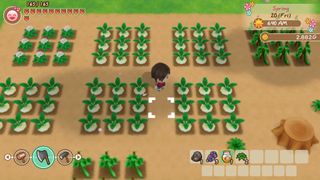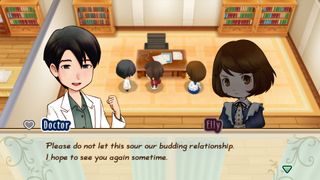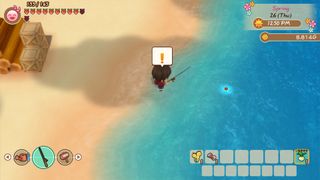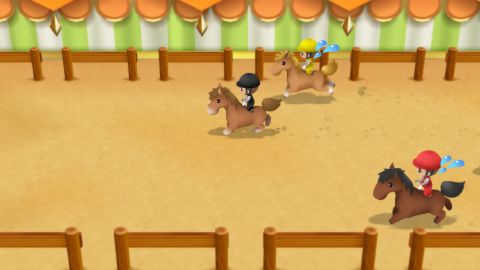Our Verdict
A faithful recreation, but why go back when Stardew has since perfected the genre?
PC Gamer's got your back
What is it? Tired farming sim.
Expect to pay $50/£43
Developer Marvelous Inc
Publisher Xseed Games, Marvelous USA
Reviewed on Intel Core i7-7700, CPU @ 3.60 GHz, 16GB Ram
Multiplayer? No
Link Official site
After getting a veggie patch of my own in real life I’ve finally figured out why every farming game begins with mastering turnips—they are quick and easy to grow. And while you’ll never be able to make a living off of them like you can in Story of Seasons: Friends of Mineral Town, at least the real ones will have some flavour.
Things kick off with a letter from a distant mayor. Before you know it you’ve taken over your dead grandfather's dilapidated farm, desperately trying to scrounge for berries in the wild to afford your all important turnip seeds. There’s a town filled with people to woo, events to attend and even a mine to explore. Sound familiar? This is the inspiration for the agricultural colossus that is Stardew Valley.
Time for a confusing history lesson. Story of Seasons: Friends of Mineral Town is a remake of the 2003 Gameboy Advance classic Harvest Moon: Friends of Mineral town. The Harvest Moon name belongs to the old publisher Natsume, hence the change to Story Of Seasons here—even though it's the same game, which is itself a remake of Harvest Moon: Back to Nature, released on PlayStation 1 back in 1999. The original is well loved and helped popularise the sedate toil of farm work, but yikes it’s showing its age.

Mineral Town itself is a pretty place to live—everything has cute, round edges and the only danger you’ll ever face is a late bedtime. There’s a lovely little library, a scenic mountain path to stroll along and a beach to relax on. It’s all very idyllic, but small since it’s based on the map of a 21-year-old game. If you played the original you’ll love finding everything exactly as you remember it, but if you’re looking for a farming fix after life in Stardew Valley you’ll be left wondering what all of the fuss is about.
All of the inhabitants have their own lives and routines, but they’re all shallow ones based on tropes. The girl with glasses is shy and works at the library, the artist is brooding and ‘mysterious’ (the mystery being where his personality went), your childhood friend is also there. Several are romanceable, but I resented handing over my precious turnips to befriend most of them as they’re all so boring.
I started wooing the Doctor as he seemed like the only serious adult in the village—a man dedicated to the pursuit of science and medicine. But after giving him a taste of my cucumbers he gave me a ‘negative ions’ diffuser, which will apparently boost my health and help me relax? He might as well have told me to use jade eggs and go on a juice cleanse with the amount of sense he was making. Instant turn off. All of the other singletons feel similarly disappointing. You romance one because you feel you should for the sake of the game rather than because they’re actually likeable. Again Stardew has since done it better, crafting characters you care about rather than these simplistic first efforts from the genre.

Other gripes include the farm being mostly static—the barn and coop are pre-built so there’s not a lot of layout management or customisation to do aside from crop placement. The mines are basically empty so there’s no real sense of exploration, and the events feel forced upon you rather than a fun change of pace. But hey, at least the animal design is super cute, and all of the old game guides will work when you need to look up the townsfolk’s daily routines or figure out how to actually get the fishing rod.
Despite all of that the act of farming is a pure joy. The cycle of tilling the earth, planting and nurturing your vegetables every morning is a compelling one. Despite not taking to the town, I still found myself in that comforting loop of ‘just one more in-game day’ spent brushing my cows and feeding my chickens. Progress is slow and hard-earned as the stamina bar depletes surprisingly quickly, but every tool upgrade helps you open up just a little bit more of your plot. The relaxation found in this routine is the one thing that still holds up, but even that starts to feel like a grind when there’s not much else to keep you going. You can befriend harvest sprites to help you out with the workload, but getting them to do so is yet another daily grind of plying them with appropriate gifts.

There are a few modernisations. You can save anywhere you like rather than just at the journal by your bed, have the ability to change outfits, and there’s an easy mode that gives you a gold boost to shipping items. Mostly, though, this is a completely faithful recreation. Some of the modernisations don’t go far enough. You now have some creative control over your character, but with only four avatar options (two men and two women), and three skin colour options (pale, paler, ambiguously tan) it feels out of touch. Why not go further and have an actual character creator? Being able to better make a farmer in your own image won’t take anything from the original experience.
It’s been 17 years since the GBA version and while it’s great that they’re trying to recapture that nostalgia that made people fall in love with the genre in the first place, things have moved on. It makes for an interesting history lesson if you want to see what inspired Stardew Valley and how far things have progressed since then, but perhaps it’s time to put Mineral Town out to pasture.
A faithful recreation, but why go back when Stardew has since perfected the genre?

Genshin Impact's missing English voice acting returns in its latest trailer, but players aren't sure if they should celebrate yet

Palworld developer reports Nintendo's suing over 3 Pokémon patents for only $66,000 in damages, but a videogame IP lawyer says fighting the lawsuit could mean 'burning millions of dollars'

The best Black Ops 6 map for XP grinding finally got a 24/7 playlist, so you know what to do
